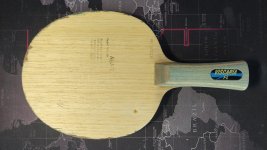Tony's Table Tennis Rocks said:
I think we can say there is not more than 200 or 300 players that is making a good living out of table tennis.
the definition of good has a wide range, but I think for now, lets just say it breaks even.
I guess after playing years are gone/retire, one would need to continue to work as a coach etc,
of the 200-300 players who earns money to play, it is in the following places:
1) China super league players
2) Euro leagues (Germany, France, Russia) - I group them together as it is the same players playing every where.
3) Taiwan private funded clubs
4) India bank funded (maybe that is the reason why India is growing so fast - there is funding)
5) Japan
6) Korea
I do not know how it is for international pros, K-League pros, or the city teams semi-pros in Korea, so I comment on the amature TT world there.
In general, if there is a very high participation rate, then there is a demand and market for TT clubs, which in turn gives a path to a former player to be a coach or club owner if the costs to entry are relatively low. The cost to entry in Korea ARE relatively low. The typical club is a 3rd floor or basement place somewhere with reasonable or bargain rent/lease having 4-6 tables for play and 2 tables for training, often a separate table for a robot. $25,000-$40,000 USD can get things basically started. Koreans, even if they do not have cash, will pull that figure easily from their tail somehow, often from relatives. They do that to get a place to live, which ranges from 1/2 million USD to several million. Not so many rent there, they mostly buy or drop down a huge lump sum to use the place and get it back when they leave.
The average place has an owner, and they usually hire one coach, sometimes two, but mostly one.
So, there is a strong potential for ex-players, regardless of their level to have a possibility to make a living in TT.
If TT is a school sport, then mom would be incline to give the child extra training and buy them the best equipment and uniforms money can buy. This would bode well for clubs and coaches. However, in Korea, the grade school, middle school, and high schools hire an ex-pro player to setup a pro-style training camp right inside the school. The kids real job in school isn't to learn English, Math, Science, but to level up in TT and bring glory to the school. The coach makes maybe $3000 USD a month, which is OK money to live on if you already have your own apartment paid off. If you rent, you are just getting by barely with that income.
So, in Korea, the ex-K-League pros and lower international players who were 50/50 to be on national team get these relatively low paying school training positions. These players require only time to time employment, or only want to work when they want to, they enjoy this flexibility, they know they are in demand, so they know they will get work somewhere soon when they decide to work.
The top ex-pros either made enough to live well enough if they have paid off apartment, or they open HUGE clubs with a large initial investment for a new facility. Recently RSM and KJH have done this. You pay an extra $100 USD a month to get lessons from that level of pro. If they can get 100 members and 1/2 of them to take lessons, then their investment pays off... if not, then it is down the drain... reboot... pull some money outta the tail feathers and try it again.
What if you were higher than elite amature player, but not a national player or 50/50 candidate? Then you open an amature club with a little better sized facility requiring less investment. Generally, their kind of clubs will have 6-8 tables for open play and a few tables for training. Some of these places hire two coaches. Generally, these places succeed, some don't, but most do. Often, the spouse of the owner has a day job and they are saving up for their kids' future school/training. These small clubs make the owner anywhere from $1000 USD to $6000 a month after expenses depending on membership, how many coaches they hire, and location.
Some ex-pros open a smaller 4-6 table club, but usually they go big.
What if you were an elite amature player, but never made it to semi-pro, pro, or international pro level?
Then you choices are to have your momma carry you through life, pursue a career other than TT (buy they cannot, they were athletes who were not in school for education) (even then it is a dog fight where only 25% succeed), work in family business delivering chicken and beerz, or hire on as a coach in an amature club. These coaches, if they have 30 players to give lessons to, can expect to make about $2000 USD a month. They get a little more if they train 50 players a month twice or three times a week.
So, in Korea, there really isn't big time money after TT playing career is over, but there is still enough demand for TT so that an ex-player can still make a not-so-elegant living wage if they have their apartment all paid off. (or still live with mom, which is common up to age 45)











